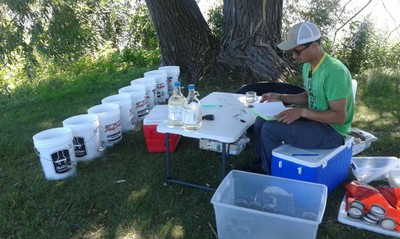Environmental Engineering Technology
Making the world a better place
Environmental engineering technology responds to northeastern Wisconsin manufacturers’ and municipalities’ workforce needs as well as addresses 2010–2020 Bureau of Labor Statistics projections estimating a 14 percent increase in environmental engineering technology positions. Graduates are prepared to work in a number of industries both in and outside of manufacturing, such as in industrial waste treatment, water and wastewater management, agribusiness, environmental consulting, ecological evaluations and biotechnology sectors.


NEW! Certificate in Environmental Monitoring
Two of the following (4-5 cr)
EGRT 201 Introduction to Air Quality (2 cr
EGRT 202 Introduction to Water and Wastewater (3 cr)
EGRT 203 Introduction to Solid Waste (2 cr)
Both of the following (4-6 cr)
EGRT 374 Field Sampling & Analysis (3 cr)
EGRT 397 Environmental Lab Operations (1-3 cr)
9-11 Total credits (9 credits minimum)
Program Educational Objectives
These Program Educational Outcomes describe the qualities and circumstances that we expect graduates of our program to embody 3-5 years after earning their degrees. The Bachelor of Science degree with a major in Environmental Engineering Technology is founded on a well-rounded, liberal education program that will prepare graduates with the skills to succeed and adapt to change in today’s rapidly evolving workplace.
- Graduates will be employed in a degree-related field and begin to assume greater responsibility and leadership within their company;
- Graduates will communicate effectively in oral, written, and visual modes and exhibit ethical behavior, professionalism and a respect for diversity as they pursue a career in industry;
- Graduates will apply their critical thinking skills and knowledge of engineering and technology to identify, analyze, and solve problems during the design, development, implementation and improvement phases of projects;
- Graduates will pursue lifelong learning and continuous improvement through additional training, active membership in professional societies, and other high quality developmental endeavors.
Program Criteria
- Conducting sampling of environmental media;
- Performing field and laboratory measurements of environmental parameters, including use of common instruments and equipment appropriate to environmental technology;
- Applying quality control methods in sampling and measurement and utilizing basic statistical techniques in analysis of the results;
- Preparing reports to adequately describe results of environmental sampling and measurement;
- Explaining operating principles of a range of unit processes for environmental control;
- Performing CAD and GIS operations and applying them to solving engineering problems;
- Applying probability and statistics to measured data and performing risk analyses;
- Formulating flow and material balances;
- Applying principles of biology, chemistry, and physics to situations relevant to the program objectives; and
- Designing basic unit processes for pollution prevention and waste treatment.
Student Outcomes
- An ability to select and apply the knowledge, techniques, skills, and modern tools of the discipline to broadly-defined engineering technology activities;
- An ability to select and apply a knowledge of mathematics, science, engineering, and technology to engineering technology problems that require the application of principles and applied procedures or methodologies;
- An ability to conduct standard tests and measurements; to conduct, analyze, and interpret experiments; and to apply experimental results to improve processes;
- An ability to design systems, components, or processes for broadly-defined engineering technology problems appropriate to program educational objectives;
- An ability to function effectively as a member or leader on a technical team;
- An ability to identify, analyze, and solve broadly-defined engineering technology problems;
- An ability to apply written, oral, and graphical communication in both technical and non-technical environments; and an ability to identify and use appropriate technical literature;
- An understanding of the need for and an ability to engage in self-directed continuing professional development;
- An understanding of and a commitment to address professional and ethical responsibilities including a respect for diversity;
- A knowledge of the impact of engineering technology solutions in a societal and global context; and
- A commitment to quality, timeliness, and continuous improvement.
Contact Us
UW Oshkosh
Department of Engineering & Engineering Technology
(920) 424-1547
engtech@uwosh.edu
Fax: (920) 424-1581

Department of Engineering and Engineering Technology
